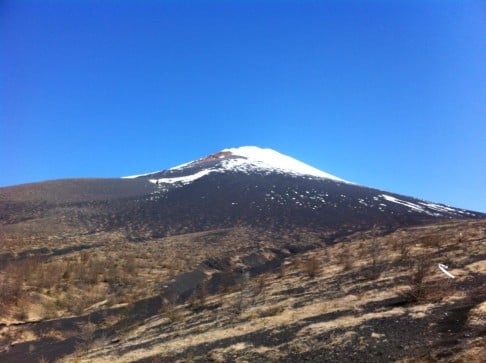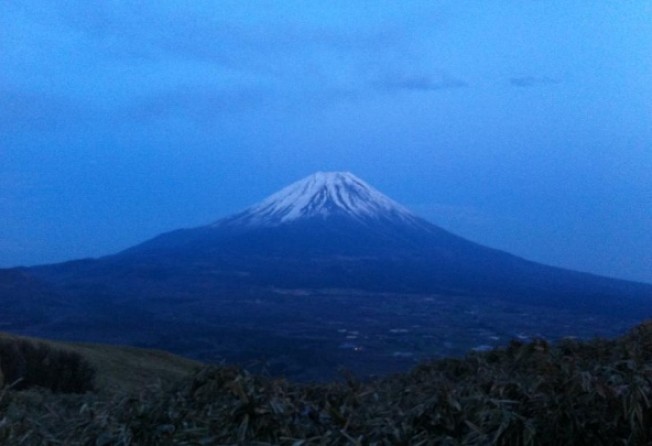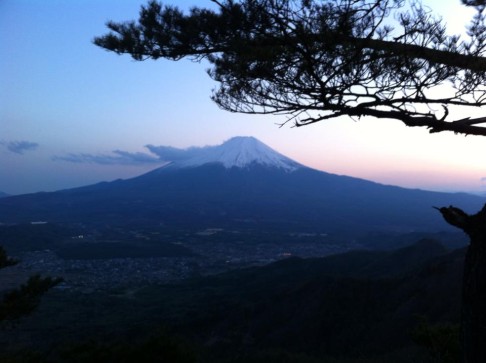
What running 100 miles taught me
On Friday, April 26, more than 1,000 people were flagged off from Yagasaki-Kouen, Lake Kawaguchi for a 161km loop in the Ultra Trail Mount Fuji race. My first attempt at the distance, I survived to tell the tale...

Completely spent with not a drop of energy left in me, I sat among the beech-lined forest trail that headed steeply up the 1,320-metre high Mount Mikuni. Having run for more than 19 hours and with more than a third of the Ultra Trail Mount Fuji race left, the prognosis was not good.
My mind was at war: the voice of pain was battling the whispers of courage. In all practical sense I was in no condition to go on; I could barely stand, much less put one foot in front of the other. It didn’t help that my stomach had been a mess since about the 80km mark. Though hungry – and obviously in need of calories – my weak body was rejecting all food: muesli bars, nuts, dried fruit, onigiri, udon, miso soup, fried potato balls, and whatever else the aid stations or my race pack had.
Starting too fast really did me in. You can remind yourself again and again to go slow and steady, that you really do need to save up for the end. The UTMF, after all, is a 100-mile trail race with more than 9,100 metres in cumulative elevation gain (Everest is 8,848 metres high) over tough undulating off-road terrain.
But as the starting gun goes and a tsunami of adrenaline rushes through your veins, and you ride on the draft of eagerness of your fellow competitors, it is hard to hold back. You feel strong and you think you could keep this pace up – everyone does on fresh legs. I hit checkpoint 2, or about 24km into the race, in 10th place. I continued to feel good till about 70km, and got to the halfway checkpoint in 13 hours 42 mins and in 14th place. But it all turned horribly wrong from there, and I struggled through the next two stages.

For five minutes I sunk into the tranquility of the Mikuniyama woods as the war raged on in my head. Fellow racers trudged past me. “Gambatte,” some offered, to which all I could muster was a blink of gratitude. A familiar face soon surfaced, a fellow Hongkonger, Rowley, looking shattered too. “You can’t give up, you’ve got to just put one foot in front of the other. Don’t worry about time, just finish it,” he encouraged. I checked my mobile phone and saw an SMS from a friend: “Come on, go for it, you can do it. A few more mountains and you never have to do 100 miles again.”
The voice of pain speaks for the physical body; it is straightforward and pragmatic. "You hurt and you’re weak – how do you suppose you’ll make it up the next step, much less the next 1,500-metre high mountain? You’re going to wreck yourself if you go on. Come on, it’s just a race. You’ve done well to get this far. Just give up. Stop."
Courage, however, is illogical. It bows to no reasons. It doesn’t consider consequences nor look far ahead. It knows only the moment. It is always positive and assuring. There are no questions with courage; just do it. Some people think courage as stupid or crazy, but that’s just people with no courage. "Get up. Take one step. There, you did it. Now, another… and another."
Before you know it, you’ve taken 10 steps, then a hundred, a thousand, and you’ve made it up the mountain. Courage no longer whispers now; it is a strong voice and the only one in the mind, having shut pain up.
After taking 4 hours 40 mins to cover stage 7's undulating 16.4km over three peaks, I reached checkpoint 8. With each step I actually felt better. My stomach accepted one 100-calorie energy gel along the journey, and at the checkpoint I scoffed down a bowl of udon. The salty hot soup was just what I needed for my cramping legs. It also helped fend off the cold, as Saturday’s impending dusk – the second of the race that started at 3pm on Friday – was starting to drop temperatures to almost freezing point on the peaks.
With 40km to go – “Just 40km,” courage would say – there was definitely no giving up now. The race clock read 24 hours. My target of 30 hours was almost certainly beyond reach, but I was well within the 48-hour cut-off. Even if I had to crawl or take a nap, I was 100 per cent sure of completing the race.
The next two stages were for me the most challenging sections of the race: a pair of long and very steep ascents, which at times needed you on all fours scrambling over huge craggy rock formations. I relished it though, because I often seek out these type of off-track routes on trail runs in Hong Kong. I made it over the twin peaks just as dusk hit. Turning on my headlamp, I flowed down the long descent to checkpoint 10.

The worst was over. The final stage, though relatively long at about 18km, was not technically tough. After a winding ascent on gravel and soft dirt trail from about 700m elevation to 1,400m, the course hit a long stretch of wide tarmac road. It was pretty much all downhill (and tarmac or gravel) from here – about 12km in total – till the finish line. This was perhaps the best section I had since the 80km mark; certainly the strongest I felt since then. I ran almost the whole way.
“Thank you god, thank you god, thank you god,” I repeated to myself, as the bright lights of the finish line at Lake Kawaguchi came into sight. The time was 1.42am on Sunday. After being on my feet for more than 34 hours, I finally completed my first 100-mile race. Courage would have it no other way.
In the days following the race, while enjoying a week-long break in Tokyo and Kyoto, I’ve had much time to think about how to fill in the blank I’d posed in my previous post: “If you want to win something, run 100 metres. If you want to experience something, run a marathon. If you want to ______, run 100 miles.”
I have really cracked my head trying to sum up everything I felt over those 34 hours in a short phrase. This, for now, is the best I’ve come up with: “If you want to know what you’re made of, run 100 miles.”
To have my spirit utterly broken at that point in the race, and yet be able to search deep within for the courage to go on, has left me emerging from the race experience with a renewed perseverance and drive for life. There is really no mountain too high that can’t be scaled, no weariness that can’t be overcome, no challenge too big and no heart too small.
At the end of the day, I think what each person gets out of running such a long distance is very personal, because what each puts into it is unique. The blank could be filled with something very different for you; perhaps – just perhaps – you could run 100 miles to find out for yourself?
With courage, anything is possible.